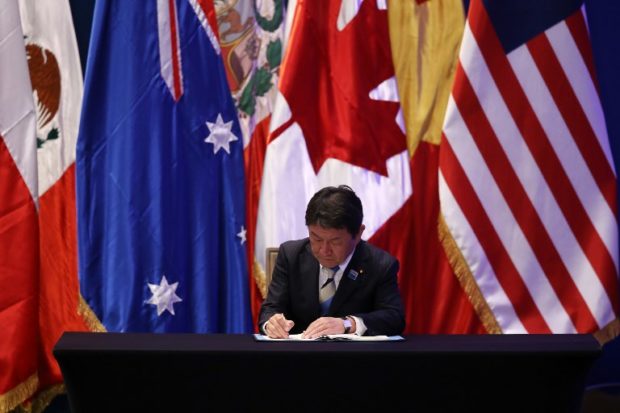
Japan’s Minister of Economic Revitalization Toshimitsu Motegi signs the rebranded 11-nation Pacific trade pact Comprehensive and Progressive Agreement for Trans-Pacific Partnership (CPTPP) in Santiago, on March 8, 2018. AFP FILE PHOTO
TOKYO — The Annual Report on the Japanese Economy and Public Finance, submitted to a meeting of the Cabinet on Friday by Toshimitsu Motegi, minister in charge of economic revitalization, stressed the importance of encouraging individuals to improve their skills while making new technologies available to supplement the labor force.
The report examined how the increasing use of AI and the internet of things — technology that connects devices and objects through the internet — will affect the country’s employment outlook.
The report said jobs that involve routine tasks, such as clerical work and accounting, will decrease. On the other hand, demand will rise for high-expertise professions and positions that require advanced communication skills, such as sales.
“The development of personnel who can lead technological innovations and who have specialized skills that cannot be easily replaced by new technology is an urgent matter,” the report said.
It estimates that if companies increase the time and money they invest in employees by 1 percent per person through training and other means, labor productivity will increase by about 0.6 percent.
The report also noted that workers benefit by taking initiative in developing their careers. The results of a follow-up survey revealed that those who returned to school after graduation and who enrolled in self-development programs had higher annual incomes than those who did not. The annual income for those who took such initiatives was about ¥100,000 higher after two years and ¥160,000 higher after three years, compared to those who did not.
By enrolling in self-development programs, those who hold jobs that mostly involve routine tasks can increase their chance of securing a specialized position by two to four percentage points, the report also found.
The paper cited U.S. trade policy and other countries’ subsequent reactions as threats to the nation’s economic recovery.
Regarding the United States and China’s imposition of retaliatory tariffs on goods imported from each other, the report expressed concern that such measures “could also negatively impact our country through the global value chain.”